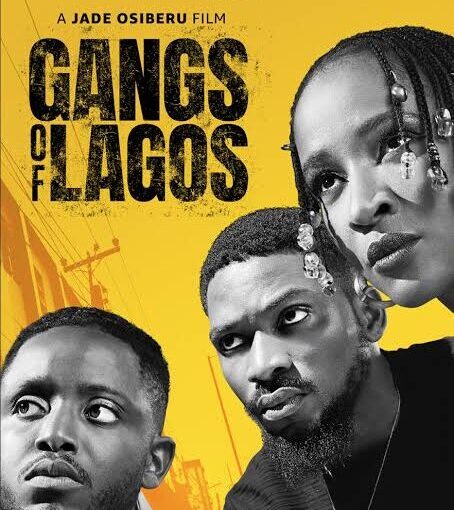Art imitates life in Jade Osiberu’s new crime-action thriller – Gangs of Lagos. The movie centred around a group of friends in the Isale-Eko area of Lagos, Nigeria tells us the story of how they navigate their lives revolving around crime and violence, with the roles of the main characters brilliantly played by a mix of some of Nollywood’s veterans and budding actors – Chioma Chukwuka-Akpotha, Adesua Etomi-Wellington, Tobi Bakre, Olarotimi Fakunle, Yvonne Jegede, Iyabo Ojo, Bimbo Ademoye, Damilola Ogunsi, Chike, and Zlatan Ibile.

The production made an impact so big that you could hear people talking about it in marketplaces and bus stops and even casually shouting, “Isale-Eko no go sleep!” (a popular line from the movie). It’s not very often that you get to see a phrase in a Nollywood movie become popular parlance, on the street, or on social media. In recent times, one can remember how ‘Welcome to a new dispensation’ from King of Boys became the slogan of many young Nigerians who have left the country, using another social media parlance – ‘Japa’. Then there is ‘Ode echi’ from Issakaba in the early 2000s, and more recently, ‘Forza Speciale” from Oloture.
Whenever a line in a movie becomes a street parlance, it’s a testament to how relatable the phrase is and how it addresses a popular issue in the daily life of viewers.
However, if you look beyond the cinematography and well-executed action scenes, the film, through its brilliant storyline and impeccable acting, you would notice that this movie was produced with an obvious purpose – to expose.

The movie, through the life of Obalola (Tobi Bakre), the narrator and main character, takes the viewers on a journey from the bottom ring of the social ladder of the streets to the top of the social ladder. We see him as a young boy stealing from cars in traffic and even holding a knife to a young girl’s throat to obtain a bag containing money from her mother. Through that scene, we see the extent to which survival instincts of the street can harden a child and sharpen their senses.
Along the line, his tact and brilliance were noticed by a gang lord, Ninalowo, fondly called Nino (Tayo Faniran), who decided to adopt him as his son. Unfortunately, Ninalowo gets killed while Obalola is still a boy, and Kazeem becomes the new sheriff in town.

Kazeem is the polar opposite of Nino. While Nino was widely loved and respected, Kazeem was feared and despised. Nino had a good heart and believed in using his influence to help the people of Isale-Eko, while Kazeem was greedy, used people for his interests, and disposed of them as he pleased.
Here, we get a glimpse of the significance of street lords and the influence they have. Through Nino, we are shown that street lords could positively impact people’s lives, the same way Nino adopted Oba and sponsored his education. We see that they are not, by default bad people.
But there’s also something to take away from Kazeem’s greed; the bigger picture – politics. From what we see in the movie, street boys answer to gang lords who answer to the Eleniyan (literal meaning – owner of men) of the area, and the Eleniyan answers to – you guessed it – politicians, and from what we are shown in the movie, the eleniyan eventually gets into politics and climb high enough to contest for governorship. Interesting!

The most unmissable message passed across by the movie, however, is that politicians are at the top of the food chain, and they make use of the streets to secure and maintain their power, and this is demonstrated in the entire gang rivalry and each gang’s support of rival governorship candidates. We find gang members killing rival gang members and Eleniyan killing Eleniyan to eradicate the influence of a political candidate.
Furthermore, we see Nino speaking to the Eleniyan, ‘Alaye Bam-Bam’ early in the movie as he revealed why he would like to retire from street life, but Alaye Bam-Bam tells him it would be better for him to use his influence to become an Eleniyan so that he as well could ‘own men’ and eventually venture into politics.
We see this as well in Kazeem’s growth and character development. At the beginning of the movie, Kazeem is an Eruku for Alaye Bam-Bam, but years later, he becomes Eleniyan.
Lastly, you might notice that some characters and scenes alluded to real-life people and events that Lagosians are quite familiar with. Could this be why the production made such a big mark on the industry? We may not be able to say.
Anyway, Gangs of Lagos makes a very exciting and even touching watch. Well done, Nollywood!
The post Gangs Of Lagos: An Artistic View On The Operation Of The Street Food Chain – A Fan Review appeared first on Nigerian Entertainment Today.



